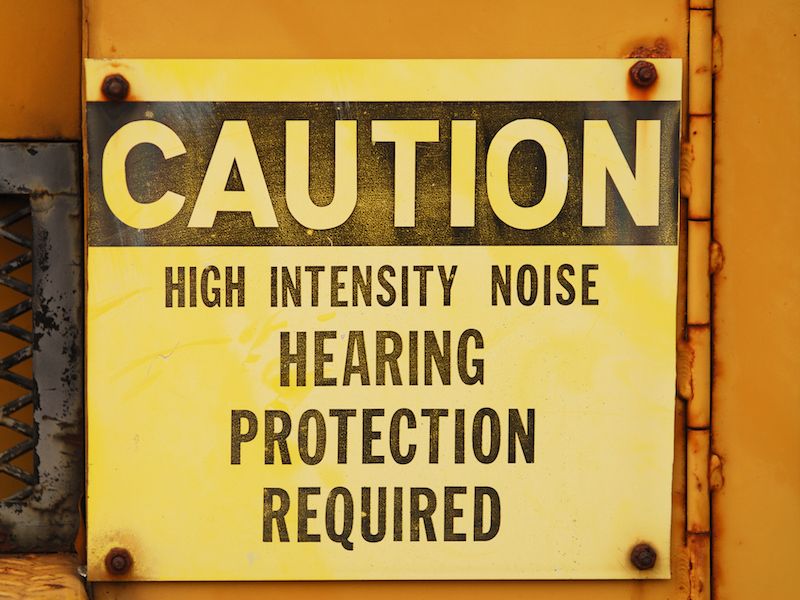
It’s one thing to realize that you should protect your ears. Recognizing when to protect your ears is a different story. It’s harder than, for example, recognizing when you need sunblock. (Are you going to go outdoors? Is the sun out? You should be wearing sunblock.) It isn’t even as easy as determining when to wear eye protection (Working with hazardous chemicals? Doing some building? You need eye protection).
It can feel as though there’s a significant grey area when dealing with when to use hearing protection, and that can be risky. Frequently, we’ll defer to our normal tendency to avoid hearing protection unless we have information that a specific activity or place is dangerous.
A Tale of Risk Evaluation
In general, we’re not very good at assessing risk, especially when it comes to something as intangible as injury to the ears or the risk of permanent sensorineural hearing loss. To demonstrate the situation, here are some examples:
- Person A attends a very loud rock concert. 3 hours is approximately how long the concert lasts.
- A landscaping company is run by person B. She spends a significant amount of time mowing lawns, then goes home to a quiet house and reads.
- Person C is an office worker.
You might believe the hearing hazard is higher for person A (let’s just call her Ann). For most of the next day, her ears will still be screeching from the loud concert. It seems fair to presume that Ann’s recreation was rather risky.
The noise that person B (let’s just call her Betty), is exposed to is not as loud. Her ears don’t ring. So her hearing must be safer, right? Well, not quite. Because Betty is mowing all day. The truth is, the damage builds up a little at a time despite the fact that they don’t ring out. Even moderate sounds, if experienced with enough frequency, can harm your hearing.
What’s occurring with person C (let’s call her Chris) is even harder to make sense of. The majority of people recognize that you need to protect your hearing while running machines such as a lawnmower. But although Chris has a relatively quiet job, her long morning commute through the city every day is rather loud. Also, although she works at her desk all day, she listens to her music through earbuds. Is protection something she should consider?
When You Should be Concerned About Safeguarding Your Hearing
In general, you need to turn the volume down if you have to raise your voice to be heard. And you need to think about using earplugs or earmuffs if your environment is that loud.
So to put this a little more scientifically, you need to use 85dB as your limit. Sounds above 85dB have the potential, over time, to lead to injury, so you should consider using hearing protection in those scenarios.
Your ears don’t have their own decibel meter to warn you when you get to that 85dB level, so many hearing professionals suggest obtaining specialized apps for your phone. You will be capable of taking the correct steps to safeguard your hearing because these apps will tell you when the noise is approaching a harmful level.
A Few Examples
Your phone may not be with you wherever you go even if you do get the app. So a few examples of when to protect your ears might help you establish a good standard. Here we go:
- Domestic Chores: Even mowing the lawn, as previously mentioned, calls for hearing protection. Cutting the grass is a good illustration of the sort of household task that might cause damage to your hearing but that you probably don’t think about all that often.
- Exercise: Your morning spin class is a perfect example. Or maybe your nighttime yoga session? You may consider using hearing protection to each one. The loud volume from trainers who use loud music and microphones for motivation, though it might be good for your heart rate, can be bad for your ears.
- Listening to music with earbuds. This one calls for caution, more than protection. Whether your music is playing directly into your ears, how loud it’s playing, and how long you’re listening to it are all things you need to give consideration to. Consider getting headphones that cancel out outside sound so you don’t have to turn up the sound to hazardous levels.
- Operating Power Tools: You understand that working every day at your factory job is going to necessitate hearing protection. But how about the hobbyist building in his workshop? Most hearing specialists will suggest you use hearing protection when using power tools, even if it’s only on a hobbyist basis.
- Driving & Commuting: Do you drive for Lyft or Uber? Or maybe you’re just waiting downtown for work or getting on the train. The constant noise of city living, when experienced for between 6 and 8 hours a day, can cause injury to your hearing over the long haul, specifically if you’re turning up your music to hear it over the din.
A strong baseline might be established by these examples. When in doubt, though, you should choose protection. In the majority of cases, it’s better to over-protect your ears than to leave them subject to possible injury in the future. If you want to be able to hear tomorrow, protect today.
